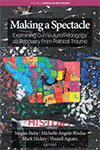
Making A Spectacle
Examining Curriculum/Pedagogy as Recovery From Political Trauma
Edited by:
Megan Ruby, Oklahoma State University
Michelle Angelo-Rocha, University of South Florida
Mark Hickey, Oklahoma State University
Vonzell Agosto, University of South Florida
A volume in the series: Curriculum and Pedagogy. Editor(s): The Curriculum and Pedagogy Group.
Published 2020
This book edition offers a collection of scholarship and reflections that goes beyond theoretical conversations. This volume helps reignite a dialogue not only by scholars but also by educators, activists, and students who believe in inclusive and equal access to education for all individuals regardless of race, ethnicity, immigration status, gender, sexuality, religion, and other identities. In this volume, the authors examine curriculum and pedagogy as a tool for recovery from political trauma and healing. They used thisas an opportunity to confront some of the politically shameful situations affecting educational environments, homes, neighborhoods, enclaves, and regions marked by socioeconomic inequality.
The authors of Making a Spectacle present wide-open questions: How are educators and school leaders learning to interact with one another, students, their families, and community while facing increased mass school shootings, police violence, racial profiling, unequal access to education and basic needs during a pandemic (COVID-19), and other forms of sociopolitical stress influenced by discrimination, institutional racism, and White nationalism? What curricular and pedagogical geographies are educators and students afforded through which to process their emotional responses to ecological or political activities witnessed in schools and their surrounding areas? These chapters and reflections/perspectives represent a diversity of positionalities within critical intersections of power and privilege as they relate to identity, culture, and curriculum and social justice, schools, and society.
CONTENTS
Introduction. SECTION I: RECOVERY FROM POLITICAL TRAUMA THROUGH RESISTANCE. Performing Nepantla: Spanglish as Visual Art Practice in the Rio Grande Valley Borderlands, Joellyn Sanchez, Ivan Cantu, Monica Varela, Maricela Casas, Maritzabel Salinas and Christen Sperry García. Reflecting Back, Kelly P. Staniunas. Living Art Out Loud: Performances at the Texas Tech University Public Art Collection, G. Dean McBride. Pluribus vs. Unum as Values in Citizenship Education, Eleni Mousena. SECTION II: ISSUES SURROUNDING AMERICAN GUN VIOLENCE AND ITS NORMALIZATION IN SCHOOLS. Only a Drill, Emily Marie Passos Duffy. Caught in the Political Machine: Educators and Active-Shooter Drills, Jessica O’Brien and Vonzell Agosto. so used to trauma, so calm, Samuel J. Tanner. Grant, Martin, Garner, Rice, and Teaching On, Brian Gibbs. SECTION III: HEALING POLITICAL TRAUMA THROUGH ART EXPRESSION. Restorative (Re) Creation(s): Releasing Thoughts and Perspectives Through Counter-Cartography, Bretton A. Varga and Kiara Flores. When the Airborne Toxic Event Broke New Orleans’ Levees, David R. Fisher. The Critical, Posthumanities as a Lens for Curriculum Theorizing: Trauma-Informed Curriculum in a More-Than-Human, More-Than-Critical World, Mary Newbery. SECTION IV: LIVED EXPERIENCES WITH POLITICAL TRAUMA SURVIVORS. Reflection: Recently Arrived—Still Under-Served: Language Learning and Teaching in the Shadows, Michelle Angelo-Rocha, Lisa Armstrong, Ann Marie Mobley, and Dionne Davis. Intentional Caregiving Through Love and Carin o: Mixed Status Families Responding to Issues of ICE and Im/migration, Larisa Callaway-Cole. Reflection: A Testimonio of Political Trauma: Coyote Meets His Match, Paul Perez-Jimenez. Patrick Stays Silent: East African Refugee Transition in American Education, Michaela Inks. Reflection: Forced “Normalcy” as Political Trauma for Students With Disabilities, Caitlin Sweetapple. Reflection: Parent Cafe Reflections, Matthew Bradley and Maura Sellars. SECTION V: POLITICAL AFTERMATH AND CREATING SPACE FOR RECOVERY/HEALING. Neutrality as Lightning Rod: Contextualizing Teachers’ Experiences in the 2016 Election Aftermath, Erin Dyke, Jinan El Sabbagh, Sarah Gordon, and Jennifer Job. Make America Great for Once (MAGFO), Chantae D. Still. Renegade Teachers: Deconstructing Heteronormative Narratives in the Classroom, Mark Hickey, Jinan El Sabbagh, and Megan Ruby. Reflection: Sisyphus With a Smile: On Finding Momentum Through Political Trauma in Education, Nadia Khan-Roopnarine. “We Are Still Here”: (Not) Teaching Disruption, Interruption, Resistance, and the Creation of Change, Brian Gibbs and Kristin Papoi. Society’s Gate Keepers, Jose Cordon. SECTION VI: MORE THAN A LABEL: EMPOWERMENT IN CREATING SPACE IN HIGHER EDUCATION. Black Academic Resistance: A Visual Arts Approach to Empirical Research, Asha Omar. A Mirror, Sarrah Grubb. Reflection: Inertia and Pa’delante, Freyca Calderon-Berumen and Miryam Espinosa-Dulanto. About the Contributors.
-
Paperback978-1-64802-291-3
Web price: $45.04 (Reg. 52.99)
-
Hardcover978-1-64802-292-0
Web price: $80.74 (Reg. 94.99)
- eBook978-1-64802-293-7

- EDU048000 - EDUCATION: Inclusive Education
- EDU040000 - EDUCATION: Philosophy & Social Aspects
- EDU034010 - EDUCATION: EDUCATIONAL POLICY & REFORM: School Safety
-
 BIPOC Alliances
Building Communities and Curricula
BIPOC Alliances
Building Communities and Curricula
-
 Collective Unravelings of the Hegemonic Web
Collective Unravelings of the Hegemonic Web
-
 Critical Intersections In Contemporary Curriculum & Pedagogy
Critical Intersections In Contemporary Curriculum & Pedagogy
-
 Ideating Pedagogy in Troubled Times
Approaches to Identity, Theory, Teaching and Research
Ideating Pedagogy in Troubled Times
Approaches to Identity, Theory, Teaching and Research
-
 Liminal Spaces and Call for Praxis(ing)
Liminal Spaces and Call for Praxis(ing)
-
 The Kaleidoscope of Lived Curricula
Learning Through a Confluence of Crises 13th Annual Curriculum & Pedagogy Group 2021 Edited Collection
The Kaleidoscope of Lived Curricula
Learning Through a Confluence of Crises 13th Annual Curriculum & Pedagogy Group 2021 Edited Collection
-
 Who Are You Without Colonialism?
Pedagogies of Liberation
Who Are You Without Colonialism?
Pedagogies of Liberation

